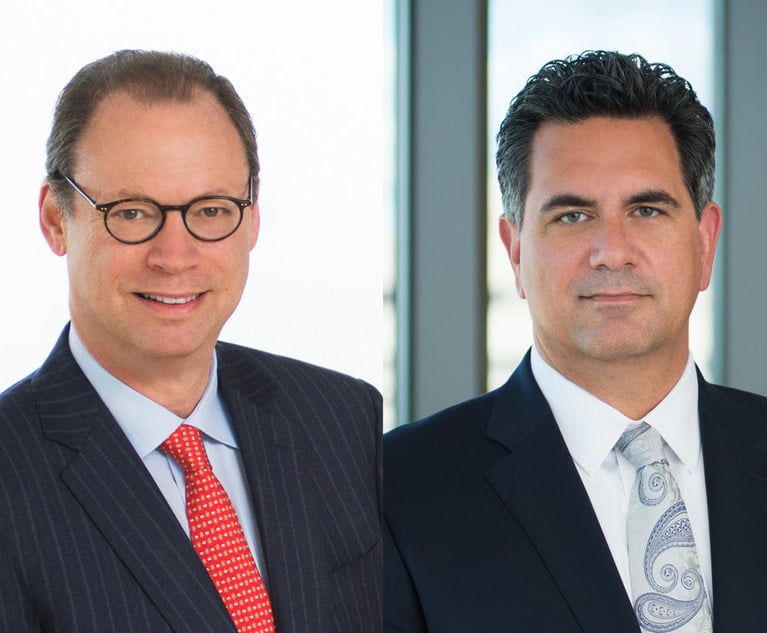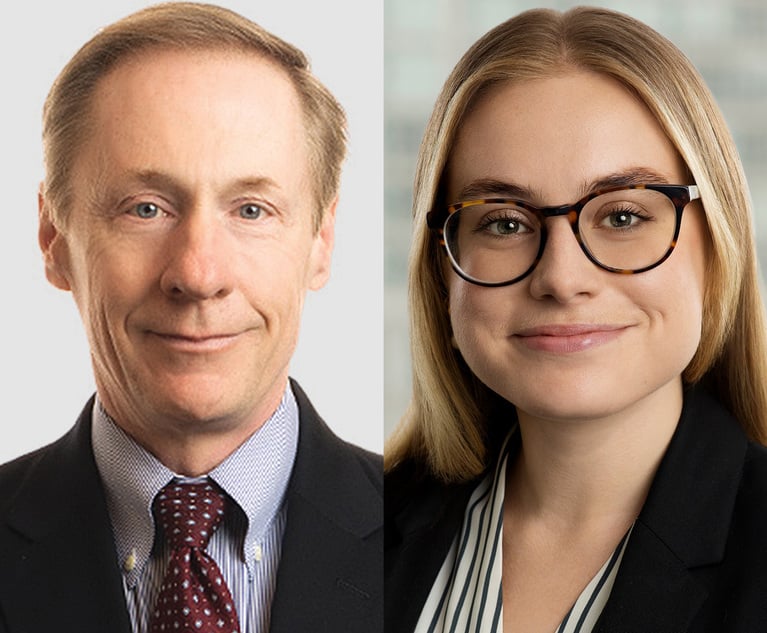State Court Foreclosure Receiver Required to Return Possession of Real Property to Chapter 11 Debtor
Many clients are not aware that the Bankruptcy Code provides that, upon the filing of a bankruptcy case, the receiver is required to give back possession of the mortgaged property to the debtor unless the lender obtains an order from the Bankruptcy Court excusing the receiver from this requirement.
October 13, 2023 at 10:26 AM
11 minute read
 Left to right: Andrew Kassner and Joseph Argentina, Faegre Drinker Biddle & Reath
Left to right: Andrew Kassner and Joseph Argentina, Faegre Drinker Biddle & Reath No sector is receiving more press about the impact of the rapid rise in interest rates than the commercial real estate industry. It seems like every day there is another article about the billions—or trillions—of dollars in debt that will mature over the next 24 months, secured by interests in real estate. For many properties, the owners' equity has been wiped out, and the lenders will be left to exercise rights to foreclose their collateral. An interim step in this process is often the appointment of a receiver to operate and or preserve the property during the foreclosure process. Many clients are not aware that the Bankruptcy Code provides that, upon the filing of a bankruptcy case, the receiver is required to give back possession of the mortgaged property to the debtor unless the lender obtains an order from the Bankruptcy Court excusing the receiver from this requirement. And most of the time, the lender does not want possession returned to the debtor that defaulted under the loan. So when can a receiver be excused from this requirement?
This decision regarding turnover ultimately involves whether the receiver or debtor is more likely to preserve and maximize the value of the property for the benefit of all creditors, not just the lender. The U.S. Bankruptcy Court for the Northern District of Illinois recently addressed this issue in In re Novus Structures, Case No. 23 B 6723 (Sept. 11, 2023), where a state court appointed receiver was not excused from turning over possession of commercial real estate property to the debtor that had filed for bankruptcy.
This content has been archived. It is available through our partners, LexisNexis® and Bloomberg Law.
To view this content, please continue to their sites.
Not a Lexis Subscriber?
Subscribe Now
Not a Bloomberg Law Subscriber?
Subscribe Now
NOT FOR REPRINT
© 2025 ALM Global, LLC, All Rights Reserved. Request academic re-use from www.copyright.com. All other uses, submit a request to [email protected]. For more information visit Asset & Logo Licensing.
You Might Like
View All
'In Re King': One Is Definitely the Loneliest Number When Filing an Involuntary Petition
7 minute read
Delaying Rent Payment by Assisted Living and Skilled Nursing Facilities in Chapter 11
7 minute read
Debtor-Owner Allowed to Modify Mortgage in Bankruptcy Even if Debtor Is Not Obligor Under the Mortgage Loan
7 minute readLaw Firms Mentioned
Trending Stories
- 1Settlement Allows Spouses of U.S. Citizens to Reopen Removal Proceedings
- 2CFPB Resolves Flurry of Enforcement Actions in Biden's Final Week
- 3Judge Orders SoCal Edison to Preserve Evidence Relating to Los Angeles Wildfires
- 4Legal Community Luminaries Honored at New York State Bar Association’s Annual Meeting
- 5The Week in Data Jan. 21: A Look at Legal Industry Trends by the Numbers
Who Got The Work
J. Brugh Lower of Gibbons has entered an appearance for industrial equipment supplier Devco Corporation in a pending trademark infringement lawsuit. The suit, accusing the defendant of selling knock-off Graco products, was filed Dec. 18 in New Jersey District Court by Rivkin Radler on behalf of Graco Inc. and Graco Minnesota. The case, assigned to U.S. District Judge Zahid N. Quraishi, is 3:24-cv-11294, Graco Inc. et al v. Devco Corporation.
Who Got The Work
Rebecca Maller-Stein and Kent A. Yalowitz of Arnold & Porter Kaye Scholer have entered their appearances for Hanaco Venture Capital and its executives, Lior Prosor and David Frankel, in a pending securities lawsuit. The action, filed on Dec. 24 in New York Southern District Court by Zell, Aron & Co. on behalf of Goldeneye Advisors, accuses the defendants of negligently and fraudulently managing the plaintiff's $1 million investment. The case, assigned to U.S. District Judge Vernon S. Broderick, is 1:24-cv-09918, Goldeneye Advisors, LLC v. Hanaco Venture Capital, Ltd. et al.
Who Got The Work
Attorneys from A&O Shearman has stepped in as defense counsel for Toronto-Dominion Bank and other defendants in a pending securities class action. The suit, filed Dec. 11 in New York Southern District Court by Bleichmar Fonti & Auld, accuses the defendants of concealing the bank's 'pervasive' deficiencies in regards to its compliance with the Bank Secrecy Act and the quality of its anti-money laundering controls. The case, assigned to U.S. District Judge Arun Subramanian, is 1:24-cv-09445, Gonzalez v. The Toronto-Dominion Bank et al.
Who Got The Work
Crown Castle International, a Pennsylvania company providing shared communications infrastructure, has turned to Luke D. Wolf of Gordon Rees Scully Mansukhani to fend off a pending breach-of-contract lawsuit. The court action, filed Nov. 25 in Michigan Eastern District Court by Hooper Hathaway PC on behalf of The Town Residences LLC, accuses Crown Castle of failing to transfer approximately $30,000 in utility payments from T-Mobile in breach of a roof-top lease and assignment agreement. The case, assigned to U.S. District Judge Susan K. Declercq, is 2:24-cv-13131, The Town Residences LLC v. T-Mobile US, Inc. et al.
Who Got The Work
Wilfred P. Coronato and Daniel M. Schwartz of McCarter & English have stepped in as defense counsel to Electrolux Home Products Inc. in a pending product liability lawsuit. The court action, filed Nov. 26 in New York Eastern District Court by Poulos Lopiccolo PC and Nagel Rice LLP on behalf of David Stern, alleges that the defendant's refrigerators’ drawers and shelving repeatedly break and fall apart within months after purchase. The case, assigned to U.S. District Judge Joan M. Azrack, is 2:24-cv-08204, Stern v. Electrolux Home Products, Inc.
Featured Firms
Law Offices of Gary Martin Hays & Associates, P.C.
(470) 294-1674
Law Offices of Mark E. Salomone
(857) 444-6468
Smith & Hassler
(713) 739-1250






